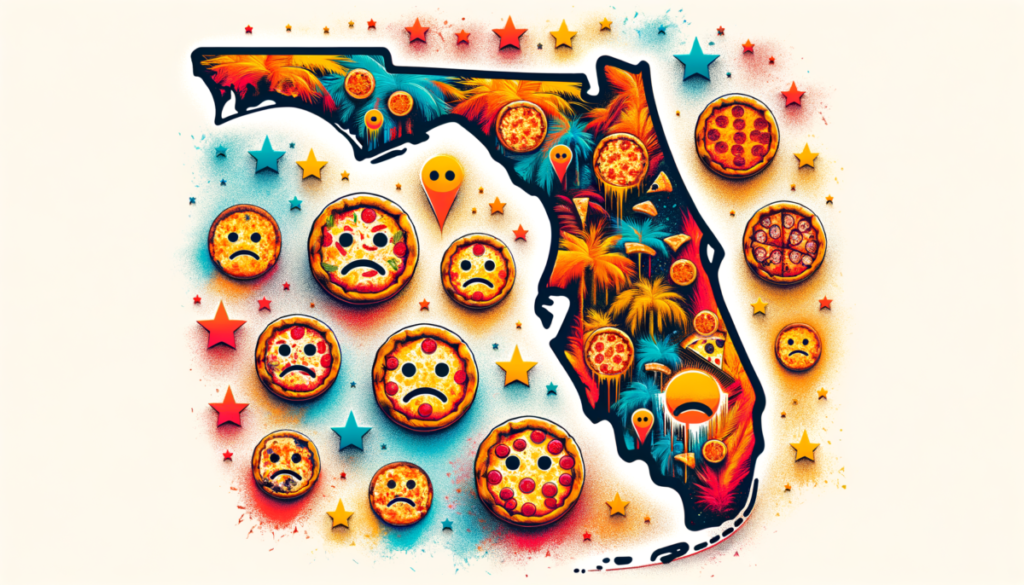Lorenzo Rossi brings his authentic Italian flair to every piece he crafts. As a seasoned pizza owner in Italy, Lorenzo combines his deep culinary expertise with a passion for storytelling.
Market and Operational Challenges Facing Florida’s Pizza Stores
Market Saturation
In Florida’s bustling business environment, pizza stores encounter the formidable challenge of market saturation. With a plethora of options available, new entrants struggle to carve out a significant presence, often grappling with diminishing customer visits and revenue streams. This intense competition necessitates innovative strategies to attract and retain customers in an already crowded space. To understand more about market dynamics and strategies for overcoming saturation, check out insights from Great Place To Work®.
Operational Fragmentation
The inherent characteristics of the pizza industry often lead to operational fragmentation, manifesting in varied food quality, inconsistent service levels, and potential delays across different locations. This inconsistency can erode brand loyalty and negatively impact the customer’s perception, creating a significant hurdle for expansion. For a deeper dive into overcoming these operational challenges, McKinsey & Company offers valuable perspectives.
Supply Chain Issues
Reliance on a broad network of suppliers for quality ingredients introduces another layer of complexity, with the potential for product unavailability, escalated costs, and quality compromises. The COVID-19 pandemic accentuated these challenges, demonstrating the vulnerability of supply chains and the need for robust management strategies to mitigate such risks. A comprehensive analysis of these issues can be found in the study by Walden University.
Labor Shortages
Florida’s labor market presents a critical challenge for pizza store operators, with many grappling with the shortage of skilled staff. This scenario can significantly impact the ability to meet customer demand, ensure service excellence, and maintain operational efficiency. Strategies to address these challenges are explored in the report by KPMG International, providing insights into harnessing a customer-first approach.
Real Estate Challenges
Securing prime real estate in Florida’s competitive landscape proves to be an uphill task for pizza store expansions. High demand, stringent leasing terms, and the quest for ideal locations make this a formidable barrier. This obstacle necessitates innovative approaches to site selection and lease negotiation, as highlighted by resources available on BOLT ON Technology.
In navigating these challenges, Florida pizza stores must employ strategic foresight, creativity, and resilience. The ability to adapt to the complex fabric of market demands, operational efficiency, and environmental dynamics will distinguish successful ventures in this competitive domain.

Economic and Franchise Challenges
High Competition
Florida’s allure for business expansion is undeniable, thanks to its robust population growth, inviting business climate, and relaxed approach to COVID-19 regulations. This environment, while attractive, breeds a high level of competition, making it tough for new pizza stores to make their mark. The state is a magnet for franchises looking to capitalize on its growth, compounding the challenge for local pizza stores aiming to expand. For insights into navigating this competitive landscape, see Great Place To Work®.
Rising Ingredient Costs
The cost of ingredients, a fundamental concern for any food service establishment, has been steadily climbing. This trend puts additional pressure on the operational budgets of expanding pizza stores, inevitably impacting their profitability and pricing strategies. Rising costs necessitate stringent cost management and procurement strategies to maintain margins while scaling up operations. This fiscal challenge is underscored in a report by McKinsey & Company.
Staffing Challenges
The hospitality and food service sectors nationwide, including in Florida, are wrestling with staffing issues. From recruitment to retention, managing human resources effectively has become a significant hurdle. These challenges not only affect service quality but also limit the operational capacity and expansion potential of pizza stores. Strategies to combat these issues are further explored in the study by KPMG International.
Supply Chain Management
Supply chain disruptions pose a perennial threat to the sustenance and growth plans of pizza stores. Ingredient shortages and delayed deliveries can critically undermine the ability to offer a consistent product, essential for customer retention and brand strength during expansion endeavors. The impacts of supply chain disruption on the food service industry are detailed by Walden University.
Franchise Restrictions
Expanding within Florida’s franchise-friendly environment may seem straightforward, but specific regulations can complicate the process. These restrictions may include franchise disclosure requirements, registration with state authorities, and compliance with franchise regulations, which, if not carefully navigated, could stall or derail expansion projects. More information on navigating these legal hurdles is available through BOLT ON Technology.
Economic Factors
Despite offering a business-friendly climate with no state income tax, Florida is also marked by a higher cost of living and elevated labor expenses compared to other states. These economic factors make scaling operations more costly for pizza store owners, affecting everything from leasing commercial spaces to compensating adequately skilled labor. Critical insights into managing these economic challenges are provided by KPMG International.
The landscape for expanding pizza stores in Florida is shaped significantly by both economic and franchise-related challenges. Addressing these obstacles requires diligent planning, financial acumen, and adaptive strategies to ensure sustainable growth in a competitive market.






